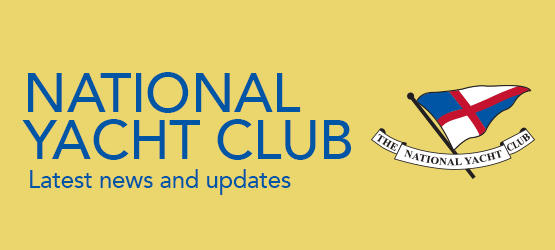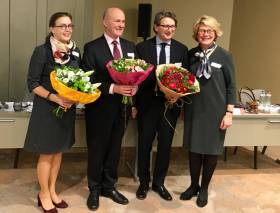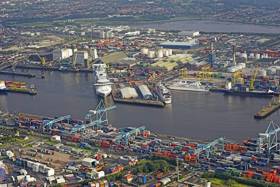Displaying items by tag: Eamonn O’Reilly
Eamonn O’Reilly to Depart as Dublin Port Chief Executive in August
Dublin Port has announced its regret that the Chief Executive, Eamonn O’Reilly, is departing the company. He informed the Board of his decision to leave at the end of August 2022.
Mr O’Reilly has been in the position since 2010. Over the past twelve years, the company’s business volumes have grown by one quarter and profits by more than one-third, and under Mr O’Reilly’s leadership, the strategic direction of the company has been transformed by Masterplan 2040. He has overseen capital investment of €500 million in nationally critical port infrastructure and there is now a pipeline of projects and finance in place to allow development to continue to bring Dublin Port towards its ultimate capacity by 2040.
In his early days, Mr O’Reilly devised the concept of a 30-year Masterplan for Dublin Port which has provided a long-term blueprint for port development and, within that, he identified the need for a transformation in the relationship between the Port and the City. The success in achieving this essential strategic objective has resulted in new and diverse cultural, heritage and community initiatives to strengthen this important link.
The Board is now beginning the task of recruiting a new Chief Executive to ensure that the progress that has been made during Mr O’Reilly’s tenure continues in the years ahead.
The Chairman of Dublin Port Company, Mr Jerry Grant, commented as follows:
“I and the Board are very sorry to see Eamonn depart. We are very grateful to him for his professionalism since taking on the role in 2010 and we wish him every success in the next phase of his career. Eamonn has made a great contribution to Dublin Port over the past twelve years and has built up a top-class management team to continue the work of Masterplan 2040 in the coming years. Eamonn fulfilled his dual role as Chief Executive and as a Board member with dedication, enthusiasm and drive. He has left a lasting legacy in terms of the strategic development of the port, its reintegration with the City and the exceptional executive team managing this vital public infrastructure.
“The position of Chief Executive of Dublin Port is both challenging and exciting and our challenge now is to ensure that the recruitment process that has commenced will attract a strong field of candidates, leading to the appointment of a worthy successor to Eamonn.”
"I have relished every day of my time in Dublin Port and enjoyed the challenge of developing and implementing Masterplan 2040"
Eamonn O’Reilly reflected on his departure as follows:
“When I took the job in 2010, I did not envisage that I would still be here twelve years later. I have relished every day of my time in Dublin Port and enjoyed the challenge of developing and implementing Masterplan 2040. Having gone through Brexit and with all three Masterplan projects up and running - two under construction - it’s the right time for me to move on.
“At this stage, Dublin Port is well resourced in terms of plans, finance and people to maintain the momentum needed to deliver the additional cargo handling capacity that is required and to consolidate the revived relationship between the Port and the City. I will leave Dublin Port with great memories of the colleagues and friends I have worked with both in the Port itself and in local docklands communities. Dublin Port was the eighth chapter of my career and I am looking forward with excitement to the new challenges and opportunities ahead.”
#Ports&Shipping - Eamonn O’Reilly has been unanimously re-elected as European Sea Ports Organisation (EPSO) Chairman following a vote of the organisation's General Assembly in Brussels yesterday afternoon.
For the past two years O’Reilly has been chairing ESPO in addition he is the Chief Executive of the Dublin Port Company since 2010.
The General Assembly also re-elected Annaleena Mäkilä and elected Zeno d’Agostino as Vice-Chairs. Ms Mäkilä is currently Managing Director of the Finnish ports Association and has been Vice Chair since 2014. Mr d’Agostino is President of Assoporti, the Italian Association of Ports and President of the Port Network Authority of the Eastern Adriatic Sea. Z. d’Agostino replaces Bernard Mazuel (UPF-France) who has been Vice Chair for the last four years.
Upon his election, Mr O’Reilly said: “I am very honoured to have been asked by my colleagues in the European port industry to continue as Chairman of ESPO for another two years. ESPO is a creation of the movement to realise the Single European Market and for 25 years has represented the interests of our industry in dialogues with the European institutions. The EU and ESPO are much changed over this time and new challenges lie ahead. The first 25 years of ESPO has coincided with the creation of the legislative framework for Europe’s ports. The next 25 years will be more about implementation. This change of emphasis sees ESPO adapting to the needs of its member ports with value-adding initiatives such as EcoPorts, PortinSights, the new Port Business Platform and the now ten year old ESPO Award promoting port-city integration. These initiatives will be of increasing importance in the years ahead as ESPO and the EU respond to the forces of change."
During its General Assembly, ESPO also published its Annual Report 2017-2018, which outlines the activities of the organisation over the past year. A copy of the report can be found here.
ESPO also congratulates Port of Dublin, for renewing EcoPorts’ environmental management standard (PERS). Isabelle Ryckbost, ESPO’s Secretary General, Sotiris Raptis, EcoPorts coordinator, and Zeno d'Agostino, ESPO Vice-Chair handed over the PERS certificate to the port representative during the General Assembly.
Being PERS certified requires amongst others that the port increases transparency by making its environmental report publicly available. It also implies that the port is effectively monitoring the environmental challenges and is implementing an improved environmental management.
“PERS has been the flagship of the EcoPorts network being the only port specific environmental standard. The transparency requirements of PERS enable ports to enhance their relationship with local communities and their market reputation within the supply chain. We encourage all ports to join EcoPorts in order to further improve their environmental performance and communicate their environmental policy,” says EcoPorts coordinator, Sotiris Raptis.
One third of the 98 EcoPorts members have now acquired PERS. Compliance with the PERS standard is independently assessed by Lloyd’s Register and the certificate has a validity of two years. PERS is revised after the 2-year period to make sure that the port continues to meet the requirements.
In addition (last night) was to be the celebration of the 25th Anniversary of ESPO and the 10th annual ESPO Award on Societal Integration.
The theme of this year’s ESPO Award is ‘Ports as a Good Work Environment for Everyone’. Deputy Director-General of DG Move Maja Bakran will be announcing the winner at a ceremony taking place at ‘Palais des Académies’ in Brussels. (Award winner to be known at around 10.15 pm)
Brexit Negotiators Asked by ESPO to Prioritise Impact for Ports In Potential Post-Brexit Scenarios
#Ports&Shipping - European Sea Ports Organisation (ESPO) has developed a position paper to submit to the negotiators now that Brexit has entered the second phase.
With this paper, ESPO calls on the Brexit negotiators to prioritise transport and more in particular maritime transport in the second phase of the Brexit negotiations. Given the fact that much of the trade in goods between the EU-27 and the UK passes through ports, it is of paramount importance to consider the impact of potential post-Brexit scenarios on the ports, the transport and logistics chain in any decision making process.
“Europe’s ports need certainty and time to adapt to the new realities post-BREXIT if they are to continue to perform their vital function as nodes in intra-European supply chains. If the current short-sea fluidity is compromised, there will be no winners.” says ESPO Chairman, Eamonn O’Reilly.
More in particular European ports call upon the Brexit negotiators to take the following considerations into account:
Ensuring short-sea fluidity for roll-on/roll-off and short sea services between the UK and EU-27 should be a central objective. Currently, the Customs Union and Single Market allow roll-on/roll-off vehicle traffic to call at a port without prior reservation. This avoids congestion on the access roads to the ports and enables businesses to rely upon just-in-time logistics. The reintroduction of border controls at the EU-UK borders risks to turn ports into bottlenecks and disrupt long established supply chains. ESPO therefore calls upon the Brexit negotiators to seriously consider the financial, operational and spatial consequences of the reintroduction of border controls in ports and its wide implications for the logistic industries and communities around port terminals in the decision making on the future EU-UK relationship.
In order to effectively prepare for the reintroduction of border controls, border authorities of the UK and EU-27 Member States should already be able to discuss and coordinate on the operational level. Such talks should however only aim at preparing the ground for the different possible Brexit scenarios and should not lead to bilateral deals.
On the transition period, ESPO asks to have as soon as possible clarity on the duration and modalities of the transition period and to ensure sufficient time to allow ports and the broader logistics chain to prepare for the consequences of the UK leaving the European Union.
If border controls are being reintroduced, some ports will have to reorganise the layout of their terminals, as well as to make investments in the development of innovative IT solutions and additional workforce to cope with the increase of administrative burden. ESPO therefore urges the Commission to consider the costs of making ports that depend on EU-UK trade “Brexitproof”, in the preparations of the new Multi-annual Financial Framework.
Port stakeholders should work together in order to ensure that goods can continue to flow smoothly through ports.
Some shippers and operators are exclusively trading with EU Member States. For them, Brexit will have important consequences since they do not have the administrative and logistic services nor the experience to export to countries outside the Customs Union. Companies, especially those operating exclusively at EU level, should be informed and advised at an early stage to enable them to prepare for the likely increase in customs declarations and procedures to comply with border control requirements.
Last but not least, for European ports, an appropriate EU-UK trade agreement, which preserves trade and economic growth, is an important condition of a successful Brexit. In the absence of such a trade agreement, import tariffs on both sides will make goods traded between the UK and EU-27 more expensive. This could disturb existing trade routes and have a negative impact on the job creation and industry located within ports as well as on the overall traffic of ports that rely on EU-UK trade.
Dublin Port Leads the Public Way – Eamonn O’Reilly Podcast
This week on my podcast, I focus on what Dublin is doing about its waterfront. This follows on my last podcast about the lack of attention by many of the country’s towns and cities to their waterfronts and why they should be doing more to make those waterfronts attractive to the public, so that they would become part of local environmental infrastructure, making the ports accessible as far as possible, allowing for security and safety constraints, so that there would be more public understanding and appreciation of the importance of the ports.
Dublin Port’s Chief Executive, Eamonn O’Reilly, has spoken to me about what Dublin is doing in this regard. He has just announced the competition for public art work displays in the port and he explains to me the Port Trail is being constructed, a public viewing facility of the port, its history and culture. This is a positive development and puts Dublin far ahead of any other port in the country. What is most important is the realisation which he expresses, that public appreciation and understanding of the port has diminished and that this link needs to be restored.
And he speaks about sailing within the port area.
• Listen to the podcast below.
• I will be interviewing Eamonn O’Reilly in more depth and detail in the next edition of my radio programme podcast – THIS ISLAND on Afloat.ie about the working of the port and its plans for future expansion.
Read all the latest Dublin Port news here































































